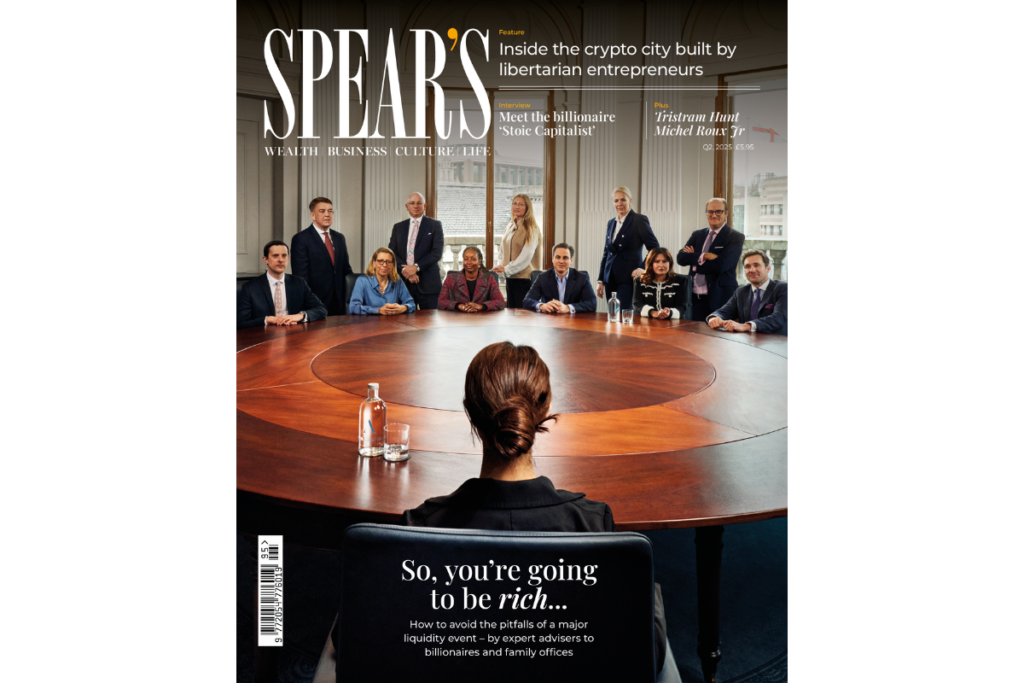
Selling a business or inheriting a fortune – going through a major ‘liquidity event’ – usually poses at least as many questions as it answers. How much of the money will you actually end up with? How should you invest or spend the proceeds?
Where should you live? How much should you give away, and to which causes? What risks do you face now that you didn’t before? What does it all mean for your family? And what should you do next?
[See also: How high earners can reduce their UK tax bill in 2025]
Pitfalls abound. Tumble into too many and you could end up feeling as though your newfound wealth is less a blessing and more a curse. Fortunately, help is at hand. In these pages, Spear’s has assembled a council of top advisers to billionaires, UHNWs and family offices to dispense their hard-won wisdom to a fictional entrepreneur, ‘Odette’, the founder and majority shareholder of a tech company that she plans to exit in the coming months. Odette believes her equity in the business is worth £100 million, she is a UK tax resident, and she and her partner want to get married soon. We asked ‘What should she do now?’
The Early Bird…
‘You won’t believe how often I get an email from somebody who says that they are exiting their business next month, and they heard that by going non-resident they can perhaps avoid capital gains tax,’ says Paul Ayres, national head of private client services for BDO in the UK.
‘The reality is that it’s just too late to do that sort of lifestyle change and have a beneficial tax outcome.’
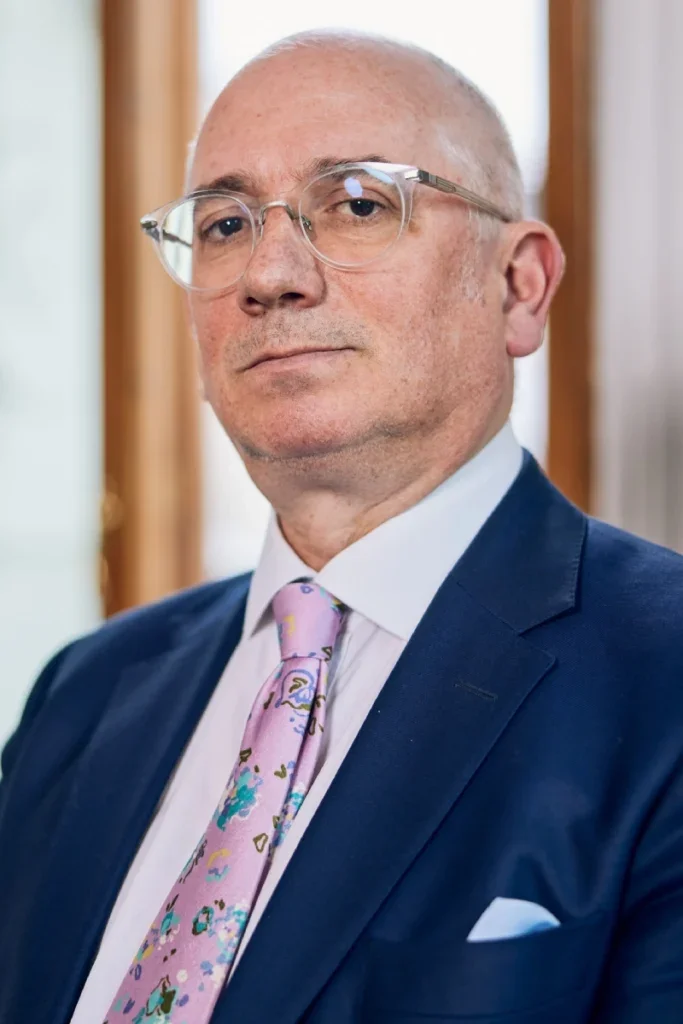
Ayres, Private Client Accountant of the Year at the 2024 Spear’s Awards, says tax planning for a liquidity event should begin ‘ideally two years, but at least six months, in advance’. ‘Have that conversation with somebody that can help you structure your personal position and can help you link in with what your purpose is – what it’s all about for you. ‘Once you know what you want, then you can build in the tax efficiencies. If you leave it too late, you’re in danger of having a reduced price on the sale, because you haven’t got all your ducks in a row. In the build-up to the transaction there may be so many demands on your time that you don’t have the ability to arrange your affairs in a way that could be tax-efficient for you afterwards.
‘Part of that pre-sale piece should be choosing a panel of people – whether it’s a family office or an investment adviser – who you can rely on and work with so that you have proper risk mitigation and a coordinated strategy, which has a number of component parts.
[See also: The best family office service advisers in 2024]
‘You might have a trust, you might have a family investment company, you might have insurance wrappers. You might have a straightforward portfolio, investing for capital gains and an income stream. Don’t put all your eggs in one basket. You need to have a diverse range of strategies.
‘Choosing the right tax adviser or accountant is crucial, but so is choosing the right lawyer, and the right investment manager or banker. It might be wise to work with one particularly competent and trusted adviser who can help build a high-quality team or network around you. That’s what you need to get the best out of your changing situation.
‘Don’t look at it as just transactional. Look at it as finding the person who will help support you through the rest of your journey.’
[See also: The best trusts, structuring and offshore experts 2024]
Know Thyself
There’s a psychological shift that happens when you’re selling a business.
The guillotine has come down and suddenly, there’s a new reality,’ explains Kedge Martin, co-founder of KM Advisory, which provides counsel to entrepreneurs, business leaders and family offices. Martin is also a former CEO of Sentebale, the children’s charity co-founded by Prince Harry.
‘Everything is going to change, particularly the relationships you have as the people around you navigate their own emotions, whether it’s envy or respect. It’s a matter of setting firm boundaries and considering the expectations that people have. If you’ve now got £100 million in your bank account while your friend has a low-paying job, is it up to you to always pick up the bar tab? It’s a jarring realisation that to some, you’re now a human ATM.

‘When you’re navigating changes like these, it’s important to have an independent sounding board, one that has no agenda other than to help you be the best person you can be. It’s easy to be serenaded by the mating call of a wealth adviser or lawyer, but an independent friend, mentor or coach can help you reflect and redefine your identity as the world around you changes, which it undoubtedly will when you suddenly have a lot more money.
‘The biggest problem entrepreneurs often have after selling their businesses is finding a renewed sense of purpose. Tools like value assessments or skill audits can be helpful; they push you to think about what’s important at that moment in time. Is it spending time with your family, or going on a solo Retreat? Is it buying a house, or donating to a charity? It can be grounding to keep checking in with yourself and ensure you’re living your life in a way that’s meaningful and fulfilling to you. I sometimes remind clients that an average lifespan is 4,000 weeks; that can focus the mind.
‘Fundamentally, it comes down to understanding who you are, external to your business and wealth. This will help to create a strong set of values, which can be built upon by your children if they stand to inherit your wealth.
‘When you have a considerable amount of money, you realise that every problem can’t be solved with wealth. Your sense of self can’t be solved either – unless your whole purpose is centred around you being a wealthy person, which it’s very often not. ‘It’s important to consider these things to avoid losing yourself. You might have five houses, but do you have even one place that feels like home?’
Hey, big spender
Entrepreneurs who have been highly capable and skilled in building out their own business in a particular sector usually have an awareness that they’re not necessarily as capable and skilled when it comes to being financial investors,’ says Khaled Said, managing partner and co-founder of investment office CapGen. ‘It comes naturally to them to look for a wealth manager to support them and help within that journey. ‘To put it bluntly, the biggest risk for a wealth creator – those with “strategic wealth” – is spending their money. Markets go up and down, there’s volatility, but ultimately the biggest risk is their own inflation and their own spending. I say that with humility, modesty and respect.
‘The best thing to do first is to find a fantastic accountant who really gets to grips with their budget and understands what they intend to do with that money: what they intend to spend it on, how they wish to live their lives. The accountant can then build out a sensible plan for the next five to seven years that incorporates investing, but also their life and their lifestyle. ‘First-generation wealth – self-made wealth – is incredibly exciting wealth.

‘It’s usually people who have been very single-minded, worked incredibly hard and created a huge amount of wealth for themselves. But what works in an entrepreneurial world does not necessarily always fit when it comes to the financial markets. ‘The minute you sell a business, there is a psychological shift, because suddenly you basically have liquid, fungible assets. Sometimes investors are slightly schizophrenic around the intentions of their different pools of capital. We’re used to that mindset, and we can help them with a very careful portfolio, but we can also help them to source different investment ideas, evaluate them, or provide them with some kind of protection when they’re making those kinds of investments. ‘We’re not doing our job well if we’re not able to get the entrepreneur to a place where they feel very confident and in control of their finances. They need to feel that they’re supported.’
Paint a picture
The most important element of approaching a liquidity event is to ‘create a clear picture of what you are trying to achieve’, says Frederick Bjørn of Payne Hicks Beach, who advises on estate planning and personal tax and trust issues.
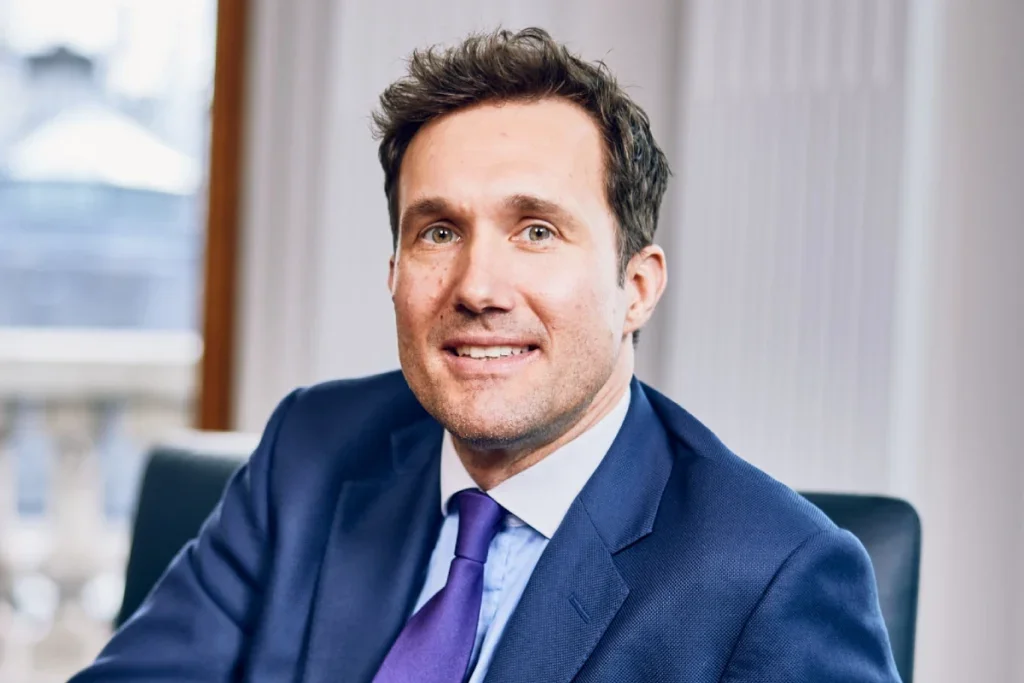
‘To do that, there are three things to consider. First, what I call the “devolution”, which is thinking about what you ultimately want to use these funds for. The answer to that question drives everything else. Then, as part of achieving your goal, you should think about whether you want to distribute wealth or put it into structures for succession planning – even if you don’t have children of your own. This step is about governance and deciding how much control you want to retain, including setting up a trust or shares in a new company.
‘Tax is only the final part of the puzzle, as any tax-efficient structuring will depend on your specific goals, whether you hope to move abroad or acquire real estate in certain countries. ‘A liquidity event really is an opportunity to review all of your financial assets, so it takes some time to establish your objectives. I’d say it is important to start thinking about it at least in the tax year prior to the event. You have to think about the fact that you are not exiting a business and going into the ether – you are effectively starting a new investment business, but in a different world.’
The house hunt
It is easy to be swept along in the buzz of a liquidity event, but when it comes to sourcing and buying the right property, time and patience are of the element. ‘A house is a big, personal purchase and it’s so important to get it right,’ says Sophie Rogerson, co-founder and managing director of buying agency RFR, who has sought out properties for many newly wealthy clients looking to upgrade to their dream home.

‘We always encourage clients not to focus on a specific timeframe. You don’t want to be held to having to buy something by a certain time, because you can be driven by the wrong motivators. Obviously, a sense of momentum and dynamism can be helpful for a search, but it’s always better to wait for the right moment than to rush into it. ‘If you intend to take out a high-value mortgage, then progressing the application as far as possible before you have identified a suitable property can be helpful. That being said, many of our clients buy with cash – or at least exchange contracts on a cash basis – because there is often hot competition for best-in-class assets and it helps to be able to move quickly. But only when you’ve found your dream home.’
Love and marriage
‘Someone in this situation needs a prenup,’ says James Stewart, an expert in international family law who is co-head of the private wealth team at Penningtons Manches Cooper.
‘My absolute rule for prenups is to keep them simple. Be frank about your income and give yourself leeway. For instance, if the business has not yet been sold, state that it’s worth £100 million, but acknowledge it may be worth considerably more. I recommend finalising the agreement at least 28 days before the marriage and translating it into both parties’ first language. When did you start living with your fiancé? The length of marriage is calculated from the day of cohabitation, not the wedding day. If you have already been living together while your business has grown significantly, there could be what we’d refer to as “a sharing argument”.
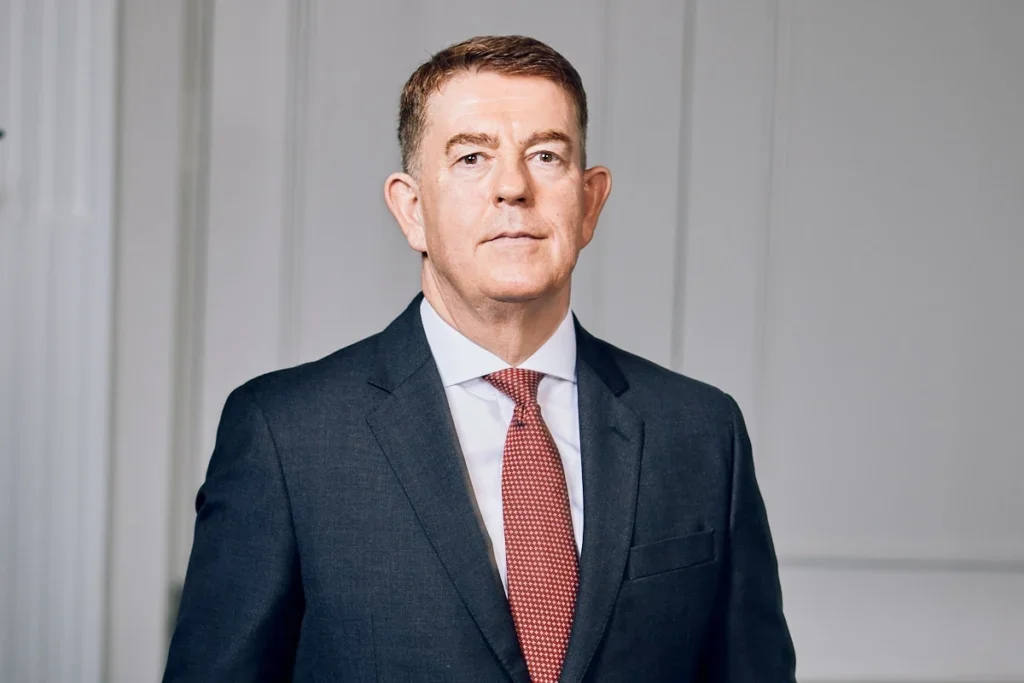
‘Of course, nobody gets married with the intention of getting divorced, but it happens. Could a divorcing spouse one day argue that they deserve a share of the value of the business that was being built up while the couple was cohabiting? To avoid this, I would advise you not to live with a partner until marriage. That way it’s clear that the business was a pre-acquired asset. One also must consider whether a purely domestic prenup will suffice. Following a liquidity event, many people explore business opportunities abroad.
‘Additionally, if your fiancé was born outside the UK, certain countries accept divorce by nationality rather than residence. So you need to think about the jurisdiction in which the prenup is enforced. In England, prenups will be upheld provided they’re not manifestly unfair. The existence of one will create a limiting effect on what your partner is entitled to. A properly drafted one will withstand the test of time.
Safety first
‘Successful business people tend to have a well-honed sense of risk in their professional lives’, says security expert Kate Bright, founder and CEO of UMBRA International Group, a concierge and secure lifestyle services business.
‘But they might not always have been aware of the risks in their personal lives. Some entrepreneurs may not be able to avoid being identified publicly as a newly minted multimillionaire, and some may decide that a degree of notoriety is helpful for ventures they wish to pursue post-exit. But there is something to be said for keeping a low profile where possible’, says Bright. ‘The more you can keep your privacy in check, the better. It helps to reduce the risk of both targeted and opportunistic criminal activity. There are key physical safety questions to be answered’, she adds.
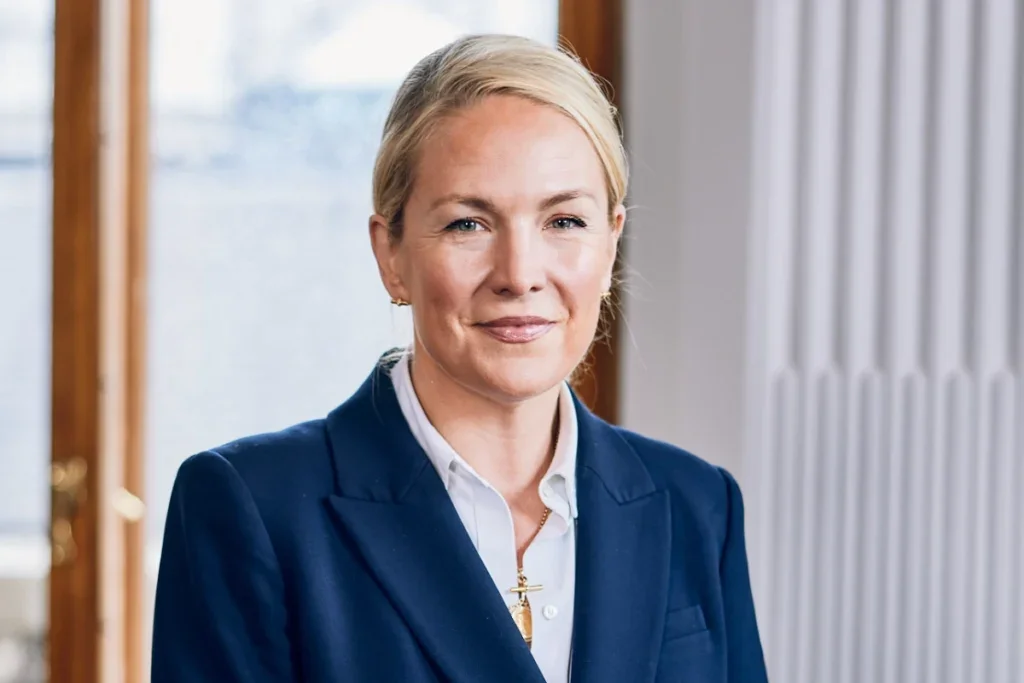
‘Where are you going to live? How are you going to travel? Have you background-checked your team? Knowing that you have trusted people around you can ease worry. For instance, hiring a security driver and a home security team is something someone at the £100 million mark should certainly think about. Physical and digital life are now more linked than ever. It’s key to map your own digital footprint, as well as those of your inner circle, to identify any weak points. The devices and internet use of children – your own or someone else’s – are one of the most obvious. Securing a home Wi-Fi network and controlling who accesses it is often overlooked.
‘You should protect your devices and network with antivirus software and use of a virtual private network. Never share your main home WiFi password; create a separate network for guests, which will isolate other parties from your main devices and prevent the spread of malware. We advise clients to consider moving conversations that could include private or personal information away from WhatsApp or Signal chat and switching to a secure email provider. In-person conversations are usually the most secure of all. Bright admits all this is unlikely to be cheap. You should view it as an investment – a secure lifestyle is an asset class.’
Loose lips
In the case of a liquidity event, Maltin PR founder and managing partner Tim Maltin says: ‘It’s always best to prepare a communication strategy as far in advance as possible. The strategy might be to actually keep it quiet – keep a lid on it and be reactive – in which case what we would do is monitor the press around the deal and prepare statements in advance. Now, if the client wanted to be proactive, we could look at two routes.
‘One would be a press release where it goes to news desks and trade press in their sector. But another might be a sit-down interview where they talk about their career history and what their plans are for the future. If an entrepreneur has been part of building their brand, they’ll already have a reputation in the market, and then we’re picking up the narrative where it left off, shaping it according to the way the entrepreneur wants to be presented in the future. Internal communications are just as important in a deal like this as external communications, so it’s very important to have a sort of “town hall” in your company to explain why the deal is happening, and how it will actually make employees better off in the future.’

Post-transaction, individuals might find themselves subject to increased attention. ‘One of the issues with having great wealth is people get interested in your lifestyle. For example, they may be tracking your jet. They might have telephoto lenses on your yacht. One has to be careful that your image can’t be taken out of context and particularly can’t be used by any enemies as a way to attack you.
[See also: The best probate and wills lawyers in 2024]
‘As you become a more influential person and a more powerful individual, you will have enemies. If you do find yourself caught in a reputational crisis, be careful about what you say and don’t rush it. Clients are often more in control of the story than they think. Sometimes people make a story worse by thinking they’re good with the press and saying something that later comes back to bite them. Don’t be pushed into saying something before you’ve properly considered it. Don’t answer calls from journalists; get that to go through your PR. Think before you speak, and get professional advice about how it will be perceived both in the echo chamber of social media and, of course, in the global media. Sometimes the best strategy is to say nothing.’
Storm detection
‘With major life events – even positive ones – unexpected issues tend to arise.’ So says Sarah Gogan, a partner at Harbottle & Lewis who specialises in immigration law and matters associated with global mobility. ‘When you make a lot of wealth, you do become a target, she says. If word gets out that you are newly wealthy, you are going to be approached by everyone and anyone. People might come to you with business investments in jurisdictions you haven’t thought of in the past. There might also be offers of citizenship to various countries; I’ve had clients being offered diplomatic passports in the past.

But along with the opportunities, there are risks – both that well-intentioned approaches can lead to bad outcomes, and also that newly wealthy people can be targets for social engineering and scams.
‘I would say, just be really careful who approaches you during this period of time. I’ve seen it all – pretty much had everything thrown at me and my clients: criminal matters, civil matters, immigration issues, asset freezing, travel bans and sanctions.’ And if you find yourself in the middle of a storm?
‘Staying calm, really, is the only advice. Don’t talk to the media, and take high-quality advice as quickly as possible. It might feel very personal, but you have to treat it strategically. Some clients just want to let out all their upset and anger; I often have to explain that sometimes there’s a way of sorting things out in a collaborative manner, rather than immediately bringing out the big guns. Be careful, and make sure you’ve got the right advisers to guide you through.
Watch out for excess
‘Coming into a lot of money can bring up conflicting emotions to process, including fear and anxiety, which means you need to think deeply about what needs to be done with it, says Stephanie Brobbey, a former private wealth lawyer who now advises (U)HNWs on using their wealth for social good through her firm, the Good Ancestor Movement.
[See also: How to prevent a Murdoch succession drama]
‘You have to understand how much is enough, and visualise what abundance looks like to you. To answer that question, you need to have a clear understanding of your values and principles. It is all about asking yourself what your wealth is doing in the world, and whether there may have been negative consequences that arose from its creation. It is important to take the time to learn about the economy, the challenges it’s facing and how your wealth is situated within it, including what it could do for social good.
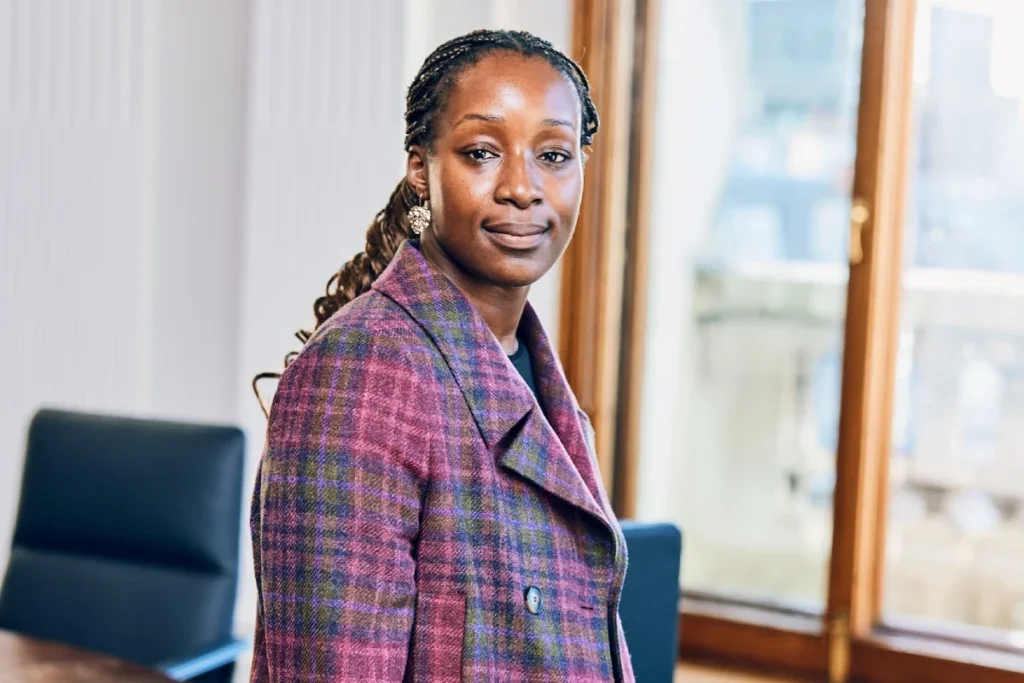
‘Building a picture of what excess looks like can be very liberating, as it can help you choose the limits around the capital you want to retain during your lifetime, and decide to redistribute the money you won’t need. In order for redistribution to be truly effective, it is essential to recognise the limitations of mainstream philanthropy.
‘A lot of advisers might tell you to set up a foundation, but decision-making power is vested in people that are working in grassroots initiatives to achieve change closest to the problems, such as community-led projects for better housing or land stewardship, so it’s essential to seek advice on how your wealth will benefit others as soon as you can. Of course, I also want to emphasise the strong personal positive feelings that can come from redistributing your wealth.’
The art of giving
‘It’s harder to give your money away well than it is to make the money in the first place – that’s what lots of people say,’ reports Mark Greer, UK managing director at the Charities Aid Foundation (CAF).
‘Choosing the causes you really want to support is important, because if your giving is not focused, you may end up feeling you’ve spread yourself too thinly. Then you might need to rethink how you might focus on a particular core area where you want to have an impact. The way you structure your giving and the vehicles you choose are also important.

‘Are you setting up your own foundation? Are you setting up a donor-advised fund? If you want to create something that can be passed down and stewarded by future generations of your own family, a foundation may be the best option.
‘But if you want to give away all the capital in your own lifetime, a DAF may be better. It can also minimise the administrative burden. The amount you choose to give plays a part, too. Because the Gates Foundation and other massive philanthropic organisations are the ones we all know about, many people assume that you need hundreds of millions or even billions to fix the world’s problems.
‘But it’s not the case. I’ve seen donations that are in four or five figures have a huge impact because a lot of charities are good at making money go a long way. You can make a difference with almost any amount of money. Investing your time and talent – as well as your “treasure” – can be incredibly powerful too.’
Photographed in the Dome Room at 1 Cornhill, one of the meeting rooms and work spaces available through Argyll. For more information: workargyll.com
This article first appeared in Spear’s Magazine Issue 95. Click here to subscribe
